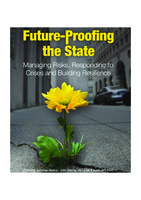Future-Proofing the State
Contributor(s)
Boston, Jonathan (editor)
Wanna, John (editor)
Lipski, Vic (editor)
Pritchard, Justin (editor)
Language
EnglishAbstract
This book focuses on the challenges facing governments and communities in preparing for and responding to major crises — especially the hard to predict yet unavoidable natural disasters ranging from earthquakes and tsunamis to floods and bushfires, as well as pandemics and global economic crises. Future-proofing the state and our societies involves decision-makers developing capacities to learn from recent ‘disaster’ experiences in order to be better placed to anticipate and prepare for foreseeable challenges. To undertake such futureproofing means taking long-term (and often recurring) problems seriously, managing risks appropriately, investing in preparedness, prevention and mitigation, reducing future vulnerability, building resilience in communities and institutions, and cultivating astute leadership. In the past we have often heard calls for ‘better future-proofing’ in the aftermath of disasters, but then neglected the imperatives of the message.
Future-Proofing the State is organised around four key themes: how can we better predict and manage the future; how can we transform the short-term thinking shaped by our political cycles into more effective long-term planning; how can we build learning into our preparations for future policies and management; and how can we successfully build trust and community resilience to meet future challenges more adequately?
Keywords
natural disasters; economics; future; futureproofing; planning; crisis; Emergency management; New ZealandDOI
10.26530/OAPEN_496491ISBN
9781925021516OCN
945782312Publisher
ANU PressPublisher website
https://press.anu.edu.au/Publication date and place
2014Classification
Social forecasting, future studies


 Download
Download Web Shop
Web Shop